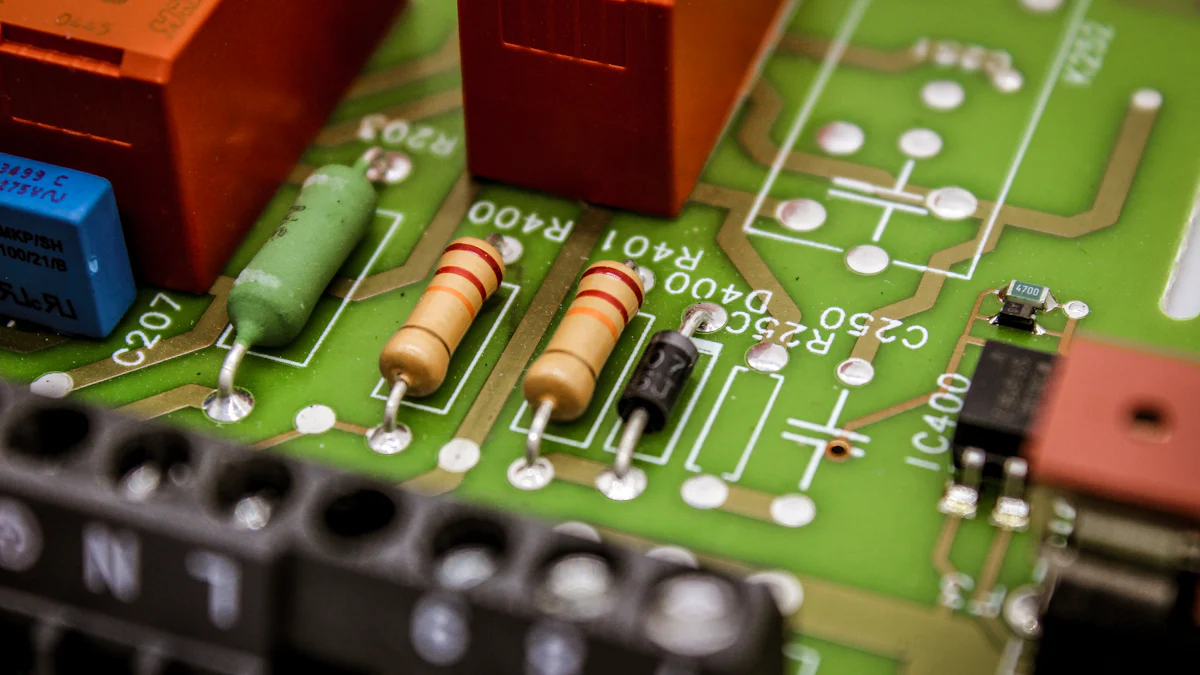popular CFR-50JB-52-1R2 product types

When exploring the most popular CFR-50JB-52-1R2 products, you will find three key types: standard, high-precision, and low-temperature coefficient resistors. Each type plays a vital role in electronics. These resistors ensure stable performance in circuits, making them indispensable for applications like power management, signal processing, and temperature-sensitive systems.
Key Takeaways
- Pick standard CFR-50JB-52-1R2 resistors for regular use. They are dependable and affordable for common gadgets.
- Use high-precision CFR-50JB-52-1R2 resistors when exact results matter. They have strict accuracy for tools in labs or hospitals.
- Choose low-temperature CFR-50JB-52-1R2 resistors for very hot or cold places. They work steadily, perfect for cars or space equipment.
Types of Popular CFR-50JB-52-1R2 Products
Standard CFR-50JB-52-1R2 Resistors
Standard CFR-50JB-52-1R2 resistors are the most commonly used type. You can rely on them for general-purpose applications where precision is not the primary concern. These resistors offer a balance between performance and cost, making them ideal for basic circuit designs. They are widely used in consumer electronics, such as televisions, radios, and household appliances. Their durability and reliability ensure consistent performance over time.
If you are working on a project that requires a dependable resistor without breaking the bank, standard CFR-50JB-52-1R2 resistors are a great choice.
High-Precision CFR-50JB-52-1R2 Resistors
High-precision CFR-50JB-52-1R2 resistors are designed for applications where accuracy is critical. These resistors have tighter tolerance levels, ensuring minimal deviation from their specified resistance values. You will often find them in medical devices, laboratory equipment, and high-performance audio systems.
Their ability to maintain exact resistance values makes them essential for circuits that demand precise control. If your project involves sensitive measurements or signal processing, high-precision CFR-50JB-52-1R2 resistors can provide the accuracy you need.
Low-Temperature Coefficient CFR-50JB-52-1R2 Resistors
Low-temperature coefficient CFR-50JB-52-1R2 resistors excel in environments with fluctuating or extreme temperatures. These resistors maintain stable performance across a wide temperature range. Their consistent resistance values under varying thermal conditions make them indispensable for precision in electronic circuits.
You will find these resistors particularly beneficial in aerospace, automotive, and industrial applications. They ensure reliability in systems exposed to harsh thermal environments. If your project involves temperature-sensitive components, low-temperature coefficient CFR-50JB-52-1R2 resistors are the ideal solution.
Tip: Choosing the right resistor type depends on your specific application needs. Consider factors like precision, cost, and environmental conditions before making a decision.
Features and Applications of Popular CFR-50JB-52-1R2 Types
Features of Standard CFR-50JB-52-1R2 Resistors
Standard CFR-50JB-52-1R2 resistors stand out for their reliability and versatility. These resistors are designed to perform well in various conditions, making them a dependable choice for many applications. Here’s a breakdown of their key features:
| Feature | Description |
|---|---|
| High Reliability | Capable of long-term stable operation under extreme conditions such as high temperature and humidity. |
| Good Heat Dissipation | Designed to effectively manage heat, making them suitable for high-power applications. |
| Suitable for Harsh Environments | Performs well in challenging conditions, including vibration and humidity, ideal for industrial use. |
| Easy Maintenance | The through-hole design allows for straightforward assembly and maintenance, reducing costs. |
These features make standard resistors a popular CFR-50JB-52-1R2 product type for general-purpose use.
Applications of Standard CFR-50JB-52-1R2 Resistors
You will find standard resistors in a wide range of everyday devices. They are commonly used in consumer electronics like televisions, radios, and kitchen appliances. Their ability to handle harsh environments also makes them suitable for industrial machinery. If you need a cost-effective solution for basic circuit designs, these resistors are an excellent choice.
Features of High-Precision CFR-50JB-52-1R2 Resistors
High-precision resistors are all about accuracy. They offer tighter tolerance levels, ensuring minimal deviation from their specified resistance values. This precision makes them ideal for applications requiring exact measurements. Additionally, they provide excellent stability over time, even in demanding conditions.
Applications of High-Precision CFR-50JB-52-1R2 Resistors
You will often see high-precision resistors in medical devices, laboratory instruments, and high-performance audio systems. These resistors ensure accurate signal processing and reliable performance in sensitive equipment. If your project involves critical measurements, high-precision resistors are the way to go.
Features of Low-Temperature Coefficient CFR-50JB-52-1R2 Resistors
Low-temperature coefficient resistors excel in maintaining stable resistance values across a wide temperature range. They are built to withstand extreme thermal conditions, ensuring consistent performance. This makes them a reliable choice for temperature-sensitive applications.
Applications of Low-Temperature Coefficient CFR-50JB-52-1R2 Resistors
You will find these resistors in aerospace, automotive, and industrial systems. They are particularly useful in environments with fluctuating temperatures. If your project involves components exposed to heat or cold, these resistors provide the stability you need.
Tip: Always match the resistor type to your project’s requirements. Consider factors like precision, environmental conditions, and cost to make the best choice.
Comparing Popular CFR-50JB-52-1R2 Product Types
Differences in Features
Each type of CFR-50JB-52-1R2 resistor offers unique features. Standard resistors focus on reliability and versatility. They perform well in general-purpose applications and handle harsh environments effectively. High-precision resistors prioritize accuracy. Their tight tolerance levels ensure minimal deviation, making them ideal for sensitive circuits. Low-temperature coefficient resistors excel in thermal stability. They maintain consistent resistance values even in extreme temperatures.
| Resistor Type | Key Feature | Best For |
|---|---|---|
| Standard | Reliable and versatile | General-purpose use |
| High-Precision | Tight tolerance for accuracy | Sensitive circuits |
| Low-Temperature Coefficient | Stable under extreme temperatures | Thermal-sensitive environments |
Note: Understanding these differences helps you choose the right resistor for your project.
Performance in Applications
Standard resistors perform well in everyday devices like radios and appliances. They provide dependable performance in basic circuits. High-precision resistors shine in applications requiring exact measurements, such as medical devices and lab instruments. Low-temperature coefficient resistors thrive in aerospace and automotive systems. They ensure stability in fluctuating thermal conditions.
Cost and Availability
Standard resistors are the most affordable and widely available. You can find them in most electronics stores. High-precision resistors cost more due to their accuracy. They are slightly less common but still accessible. Low-temperature coefficient resistors fall in the mid-range price category. Their availability depends on the specific requirements of your project.
Tip: Balance your budget with your project’s needs. Choose a resistor type that meets your technical and financial requirements.
Understanding the features and applications of each CFR-50JB-52-1R2 resistor type helps you make informed decisions.
- Standard resistors offer reliability for general use.
- High-precision resistors deliver accuracy for sensitive circuits.
- Low-temperature coefficient resistors ensure stability in extreme environments.
Tip: Match your resistor choice to your project’s precision, budget, and environmental needs. Always evaluate your requirements before purchasing.
FAQ
What factors should you consider when choosing a CFR-50JB-52-1R2 resistor?
Evaluate your project’s precision, temperature stability, and budget needs. Match the resistor type to your application’s requirements for optimal performance.
Can you use standard CFR-50JB-52-1R2 resistors in temperature-sensitive environments?
Standard resistors work well in general conditions. For temperature-sensitive environments, low-temperature coefficient resistors provide better stability and reliability.
How do high-precision resistors differ from standard resistors?
High-precision resistors offer tighter tolerance levels and greater accuracy. Standard resistors focus on reliability and cost-effectiveness for general-purpose applications.
Tip: Always review your project’s technical specifications before selecting a resistor type. This ensures compatibility and efficiency.
See Also
Top J3L-IF10-FB Product Categories You Should Know
Exploring Various J3L-IF10-FB Product Categories
Trending SMT45A-682 Models Worth Considering
Understanding ST-4ETD202 Product Specifications and Standards

